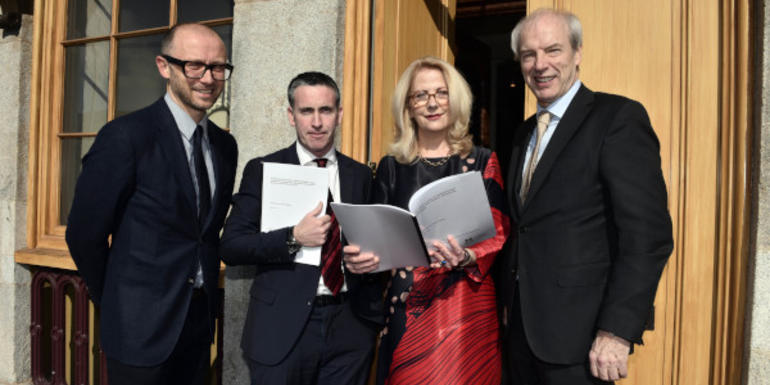
Damien English TD, Minister of State for Housing and Urban Development launched two reports authored by Dr. Philip Crowe on 27th March in the newly restored Dublin Civic Trust project in 18 Ormond Quay, Dublin 7
The reports were divided into two areas.
How data on vacancy is created and used:
Case studies from Scotland, Denmark and Philadelphia.
and
The reports demonstrate the pivotal role that Government at central and local level must play in ensuring that we have a comprehensive and easily accessible knowledge of our existing building stock and the vital role Government must play in co-ordinating and managing the creation of sustainable communities.
These reports further add to and complement the existing data available around vacancy levels, how such data is collated and measured, with a view to developing innovative solutions and initiatives to make the greatest use of our housing stock. The first report focuses on the creation and use of a reliable database on vacancy, and the second report concentrates on the incentivisation of the reuse of vacant buildings in town centres for housing and sustainable communities.
Multiple-case studies are presented that illustrate how other countries address these gaps.
Report 1:
Case studies in Scotland, Denmark and the US are presented, providing a range of different approaches. The resulting datasets on vacancy are considered critical for effective planning, policy-making and working towards a more efficient use of the limited resource of space.
Report 2:
Case studies of national programmes in Scotland, Denmark and France are presented for a range of scales and contexts. All the programmes are collaborative and recognise social, environmental and economic benefits from social cohesion at the scale of the nation (France) to the well-being of the citizen (Scotland).
Minister of State English noted that; “Pillar 5 of Rebuilding Ireland sets out a range of measures to assist in meeting Ireland’s housing needs by ensuring that Ireland’s existing housing stock is used to the greatest extent possible. My Department and local authorities have already been proactive in dealing with vacant properties and there are a number of schemes available to incentivise reactivating suitable dwellings into the liveable housing stock. We are starting to see more activity under both the Repair & Lease and Buy & Renew schemes and Local Authorities continue to exercise their powers, where appropriate, under CPO legislation.”
Continuing, the Minister welcomed both reports; “To enable the optimum number of potentially vacant dwellings be identified, it is of course, imperative that we establish a robust and accurate set of source data. The launch of these two informative documents build on the repository of data that is available to assist all stakeholders identify the greatest number of vacant properties that can be re-introduced. It sets out workable models for ensuring that sustainable vibrant communities are achievable throughout the Country.”
The research was commissioned by the Collaborative Working Group for Housing and Sustainable Living, which includes representatives from The Heritage Council of Ireland, the Housing Agency, Mayo County Council and Space Engagers.
This ongoing collaboration recognises the urgent need to address the nationwide housing crisis, to use existing buildings efficiently, and to revitalise rural towns and villages and realise their potential for creating sustainable communities.



